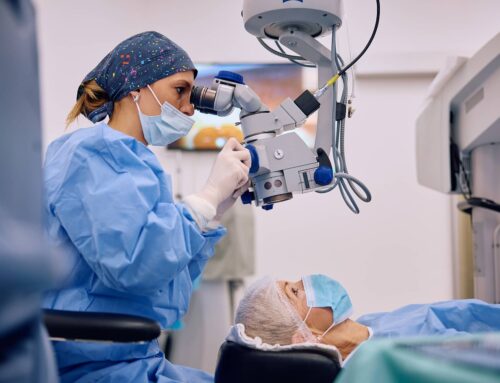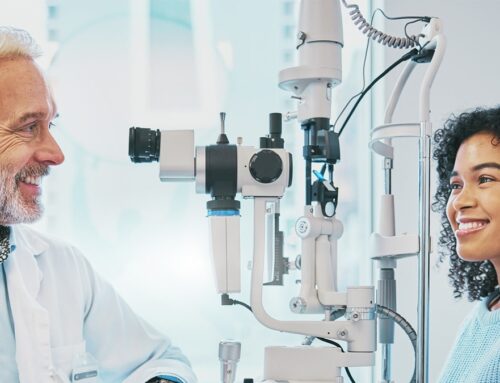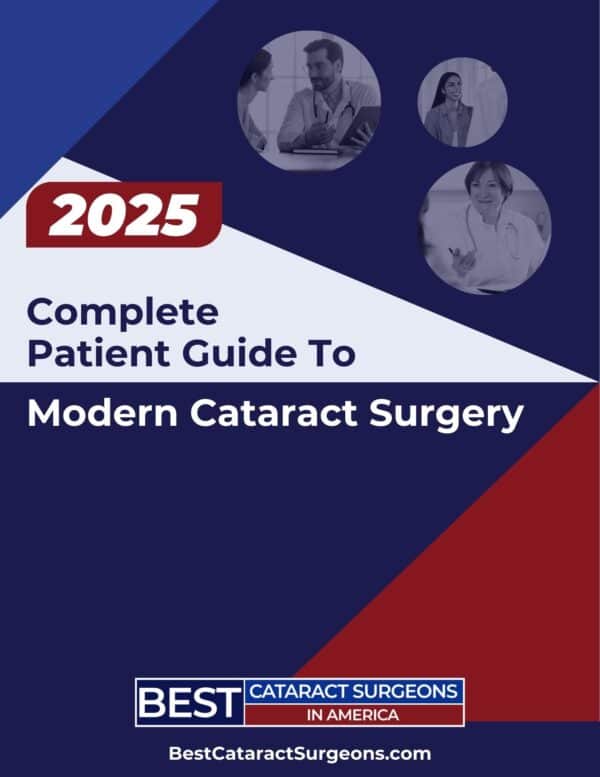Cataracts affect 20 million people globally and account for 51% of world blindness, but the good news is that they’re straightforward to diagnose and are highly treatable! If you’re over 55 and experiencing changes in your vision along with unexpected symptoms like persistent headaches, increased light sensitivity, and faded colors, it may be the early signs of cataract development. In today’s post, we’re going to explore if cataracts can cause headaches, and when to seek help, so you can take the proactive steps you need toward effective treatment and improved well-being.
What Are Cataracts?
When your eye’s natural lens becomes cloudy, this is called a cataract. While cataracts develop gradually, they can interfere with daily life as they can cause a whole host of symptoms as they progress.
Recognizing The Warning Signs – Symptoms
Early detection is key to managing and understanding cataract progression. Common symptoms include:
- Blurry or clouded vision that doesn’t improve with glasses.
- Difficulty seeing clearly at night.
- Increased sensitivity to light & glare.
- Seeing halos around lights.
- Colors fading or appearing less vibrant.
- Frequent changes in eyeglass or contact lens prescription.
If you’re unsure if you’re experiencing these, you can look for some lifestyle indicators in your everyday life. For instance, if you’re struggling to read the fine print, having trouble recognizing faces, finding reading or sewing challenging, or find that you don’t enjoy activities you once found easy.
Pro Tip: Not all vision changes mean you have cataracts, but are a signal to schedule a comprehensive eye examination with an ophthalmologist.
Can Cataracts Cause Headaches? The Connection & Indirect Causes
While cataracts primarily affect vision, can cataracts cause headaches? The answer is that they do not directly cause them, but other indirect factors can increase headache likelihood. Here’s the connecting factors:
- Straining to See. As cataracts develop, you may strain your eyes more often to see clearly. This strain can lead to tension headaches, a common type of headache caused by muscle tension in the head and neck.
- Squinting A Lot. This is a natural response to poor vision caused by cataracts. When your vision becomes cloudy, you instinctively squint to see better, which creates additional tension in the forehead and eye muscles, leading to tension headaches as your eyes work harder to focus through the haze.
- Sensitivity to Light. If you have cataracts, they can make your eyes more sensitive to light, causing discomfort that may lead to headaches, especially if you’re primarily in a bright environment all day long.
- Altered Depth Perception. Having cataracts can affect your depth perception, resulting in eye fatigue, which can cause headaches because of the increased effort required to focus and judge distances accurately. This pops up more often during activities that require precise vision, such as driving or reading.
- Increased Stress & Anxiety. Coping with vision loss because of cataracts can be extremely stressful and anxiety-inducing, which can trigger tension headaches in individuals as their bodies respond to stress with muscle tension and discomfort.
Can Cataracts Cause Headaches? Research Insights That Highlight Correlation.
Studies show that patients with cataracts may experience headaches more frequently than those without. A study published in The Journal of Headache and Pain reported cases of patients with chronic cluster headaches who also developed cataracts; additionally noting that approximately 30% of individuals with advanced cataract symptoms report experiencing headaches. The good news here is that addressing cataract-related vision issues often eases the associated headaches, making it essential for patients to get diagnosed and seek the expertise of a cataract surgeon for treatment.
When To Seek Care for Cataracts, Headaches, and Vision Changes?
If you’re experiencing persistent headaches along with other symptoms of cataracts, it’s important to seek an evaluation as soon as possible. The recommended course of action is to:
-
- Schedule a comprehensive eye exam with an ophthalmologist.
- Discuss all symptoms with your ophthalmologist, including headaches.
- Explore cataract surgery with a cataract surgeon if cataracts are diagnosed.
By taking these actions, you can get answers to whether cataracts are causing your headaches, which will lead to better management of both your long-term vision, and headache symptoms.
Your Clear Path to Better Vision Begins Here At Best Cataract Surgeons
If diagnosed with cataracts, surgery can alleviate vision impairment, reduce headaches, and enhance your quality of life. To learn more about cataracts, read our Cataracts 101 Guide, or book in with one of the best cataract surgeons near you today through our national directory.
References
Benemei, Silvia, et al. “Cataract in Chronic Cluster Headache: Two Case Reports and Review of the Literature.” The Journal of Headache and Pain, vol. 9, no. 6, Dec. 2008, pp. 401–03, https://doi.org/10.1007/s10194-008-0066-2.
“Blindness and Vision Impairment Factsheet.” Africa Health Organisation, 23 Mar. 2019, https://aho.org/fact-sheets/blindness-and-vision-impairment-factsheet/.











